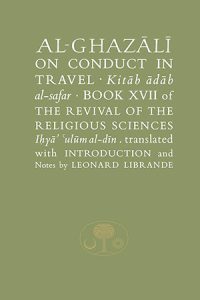Al-Ghazali on Conduct in Travel (Ihya Ulumuddin Series No. 17)

Author: Imām Al-Ghazali
Translator: Leonard Librande
Publisher: Islamic Texts Society
Year of Publication: 2015
Print Length: 204 pages
Genre: Islamic Studies / Quranic Studies; Theology, Ethics and Philosophy; Islamic Law & Jurisprudence, Science; Qur’anic Reflection, Supplication & Prayers; Non-Fiction / Religious Studies
Topic: Islam, Qur’an, Ethics & Morality, Mobility & Immobility
Al-Ghazali on Conduct in Travel is a translation of the seventeenth book of the Revival of the Religious Sciences. In it, Ghazali explains the different outer and inner reasons for travel. Outer reasons include the pilgrimage, the search for knowledge, and the flight from danger; while inner reasons include the acquisition of virtue and the disciplining of the soul. Ghazali divides travel into four classes, and portrays the right inward and outward conduct for each. He then follows this with a practical chapter on the use of religious concessions while travelling, and concludes with a final chapter on how the traveller is to establish the proper direction and times for prayer.
Table of Contents
Al-Ghazāli’s Introduction to the Revival of the Religious Sciences
Abbreviations
Preface
Introduction
Notes to Introduction
THE BOOK OF CONDUCT IN TRAVEL
Prologue
Chapter 1. On the Forms of Conduct from the First Start until the Final Return and On Travel’s Intention and Advantage
1. Travel’s Advantages, Merit and Intention
2. On The Traveller’s Forms of Conduct from His Initial Start Until His Final Return
Chapter 2. On What the Traveller Must Learn of the Concessions in Travel and the Indicators for the Qibla and the Times [for Prayer]
1. Knowledge of the Concessions in Travel
2. Tasks Rendered Necessary because of Travel
Notes
Appendix: Persons Cited in Text
Bibliography
Index to Qur’ānic Quotations
General Index

Imām Abu Hamid al-Ghazali is a 11th century Muslim scholar. He was one of the most prominent and influential philosophers, theologians, jurists, and mystics of Sunni Islam. Al-Ghazālī was born at Ṭūs (near Mashhad in eastern Iran) and was educated there, then in Jorjān, and finally at Nishapur (Neyshābūr), where his teacher was al-Juwaynī, who earned the title of imām al-ḥaramayn (the imam of the two sacred cities of Mecca and Medina). He was active at a time when Sunni theology had just passed through its consolidation and entered a period of intense challenges from Shiite Ismâ’îlite theology and the Arabic tradition of Aristotelian philosophy (falsafa). Al-Ghazâlî understood the importance of falsafa and developed a complex response that rejected and condemned some of its teachings, while it also allowed him to accept and apply others. His great work, Iḥyāʾ ʿulūm al-dīn or Ihya Ulumuddin (“The Revival of the Religious Sciences”), made Sufism (Islamic mysticism) an acceptable part of orthodox Islam.
Source: https://plato.stanford.edu/entries/al-ghazali/
More from Imam al-Ghazali in this library, click here.

Leonard Librande was Adjunct Professor of Religion at Carleton University, Canada. He received a Ph.D. in Islamic Studies from McGill University in 1976. He has studied Greek and Roman as well as Arabic paleography at St. Louis University and at the University of Pennsylvania. In past years his research and publications have focused on hadith literatures and more recently on the writings of Ibn Abi al-Dunya, with particular emphasis on travel and morality.
Source: https://carleton.ca/religion/people/leonard-librande-2/
More from Leonard Librande in this library, click here.
